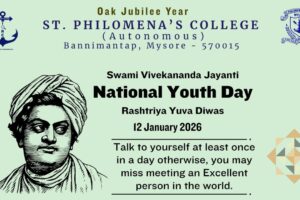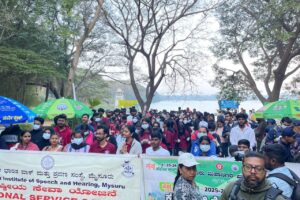
Guest lecture on “Cyber Threats and Security”
The Department of Computer Science, St. Philomena’s College, Mysuru organized Guest lecture on “Cyber Threats and Security” on 19th April 2024. The Program started at 10:00 A.M in the College Auditorium in the gracious presence of Prof .Nagaraj Urs vice principal academic, Mr. Ronald Prakash Cutinha vice principal Administration, Mr. Thomas Gunasheelan IQAC Coordinator,Dr Alphonsus D’souza UUCMS Coordinator, E. Gloriya priyadarshini H.O.D Dept. of Computer Science(BCA) and Ms. Harinakshi H.O.D Dept. of Computer Science(B.Sc), followed by Philo Anthem and invocation song by Richard and team(VI sem BCA students).

The chief guest of the day was introduced by Krithika of final year BCA. The stage was taken over by the speaker of the day Dr Anil Kumar KM; He gave insights about Cyber security.
The speaker gave insights on types of cybercrime?
- Email and internet fraud.
- Identity fraud (where personal information is stolen and used).
- Theft of financial or card payment data.
- Theft and sale of corporate data.
- Cyberextortion (demanding money to prevent a threatened attack).
- Ransomware attacks (a type of cyberextortion).
- Crypto jacking (where hackers mine crypto currency using resources they do not own).
- Cyberespionage (where hackers access government or company data).
- Interfering with systems in a way that compromises a network.
- Infringing copyright.
- Illegal gambling.
- Selling illegal items online.
- Soliciting, producing, or possessing child pornography.

Examples of cybercrime were explained like
1. Malware attacks
2. Phishing
3. Distributed DoS attacks
Tips was given in How to protect yourself against cybercrime
Given its prevalence, you may be wondering how to stop cybercrime? Here are some sensible tips to protect your computer and your personal data from cybercrime:
Keep software and operating system updated
2. Use anti-virus software and keep it updated
3. Use strong passwords
4. Never open attachments in spam emails
5. Do not click on links in spam emails or untrusted websites
6. Do not give out personal information unless secure
7. Contact companies directly about suspicious requests
8. be mindful of which website URLs you visit
9. Keep an eye on your bank statements
Finally the program was concluded with a vote of thanks followed by the Feedback from the students who attended the session.





